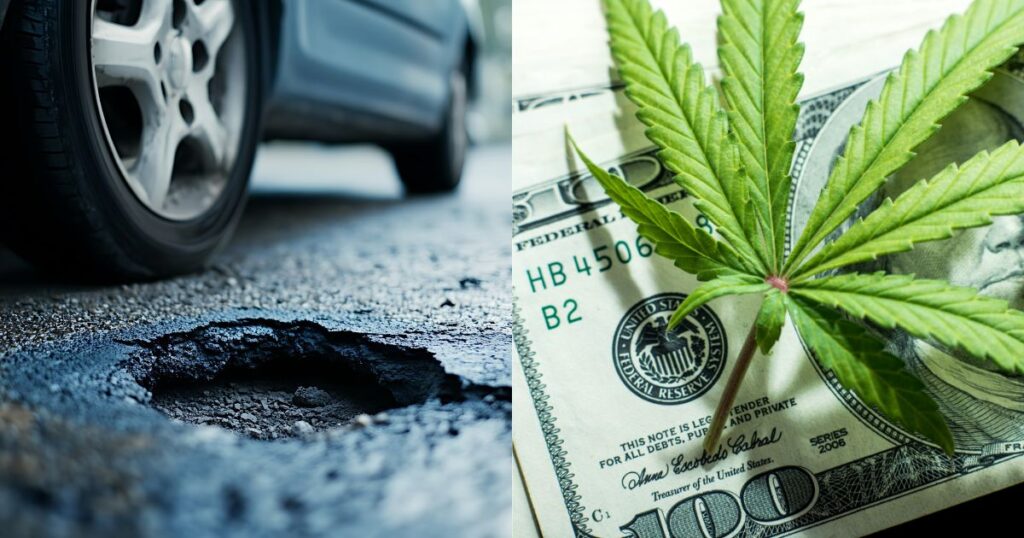Michigan lawmakers are advancing a proposal that could make the state’s cannabis tax the second-highest in the nation. House Bill 4951, dubbed the “Comprehensive Road Funding Tax Act,” proposes a new 24% tax on the wholesale price of cannabis.
The goal? To generate an estimated $420 million annually to fix Michigan’s deteriorating roads. While the state’s infrastructure certainly needs attention, singling out the cannabis industry to foot the bill is a deeply flawed and inequitable approach.
The bill, which passed the Republican-led House with bipartisan support, now awaits a final vote in the Democratic-led Senate. If it passes, this staggering tax will be imposed on an industry that has no direct connection to road wear and tear.
More importantly, it places an enormous burden on patients who rely on cannabis for medical purposes, essentially taxing their medicine at an exorbitant rate. This move isn’t just a funding solution; it’s a punitive measure that threatens the stability of a legal market and the well-being of its consumers.
24% Tax Increase to Cannabis?
Under the current law, which voters approved in 2018, recreational cannabis is subject to a 10% excise tax on retail sales, plus the state’s 6% sales tax. HB 4951 would add a 24% tax on the wholesale price of cannabis sold or transferred to a retail shop.
Combined, this would push the total tax burden for consumers to around 40%. To put that into perspective, a $100 purchase of cannabis could end up costing a consumer over $140 after all taxes are calculated. This would give Michigan the second-highest cannabis tax rate in the country, trailing only Washington’s 37% retail excise tax.
This proposal isn’t new. Governor Gretchen Whitmer initially floated a 32% wholesale tax, which was negotiated down to the current 24% figure. While some lawmakers, like Rep. Alabas Farhat, D-Dearborn, seem to believe the industry can easily absorb this hike, those on the ground know the reality is far different.
The retail price of cannabis has been falling, with the cost of an ounce dropping 24% in the last year alone. Adding a massive tax to a market with shrinking margins is a recipe for disaster.
Driving Consumers to the Illicit Market?
Industry leaders are sounding the alarm, and for good reason. “Everyone knows that a large increase in cannabis taxes drives customers straight back to the illicit market,” warned Robin Schneider, director of the Michigan Cannabis Industry Association via Bridge Michigan. When legal, tested products become prohibitively expensive, consumers will inevitably seek cheaper, unregulated alternatives.
One of the main concerns is that the tax increase will make the illicit market and unregulated hemp products far more attractive. This not only undermines the legal industry that has invested millions into the state but also exposes consumers to the dangers of untested products. The government’s tax policies jeopardize the very purpose of legalization—to create a safe, regulated market—by making the illicit market a more viable option.
This isn’t just speculation. California recently had to repeal a tax hike on its cannabis industry after realizing it was crippling legal businesses and fueling the unregulated market. Michigan seems poised to ignore this cautionary tale and repeat the same mistake.
An Unfair and Misguided Burden
The key question is why Michigan is targeting the cannabis industry to solve its road funding crisis. Proponents have yet to offer a logical connection between cannabis consumption and road damage. Unlike gasoline taxes, which create a direct link between road users and road funding, this proposal arbitrarily targets a single industry. It’s a convenient cash grab disguised as a public works project.
Furthermore, taxing a product used by many for medicinal purposes at such a high rate is ethically questionable. For thousands of Michiganders, cannabis is not a luxury item but a necessary part of their health and wellness regimen.
Subjecting their medicine to a tax burden of nearly 40% is unjust and places a significant financial strain on those who may already be struggling with health issues.
The bill’s presentation was also telling. When Rep. Samantha Steckloff first introduced the bill, she called it the “comprehensive road funding tax act,” without mentioning marijuana.
Lawmakers filed the substitute bill explicitly targeting cannabis just hours before the House passed it, raising concerns about transparency in the legislative process.
A Better Path Forward
Michigan’s roads are a serious problem that requires a serious, comprehensive solution—not a shortsighted tax on a single industry.
The 2018 law that legalized recreational cannabis already allocates 35% of its excise tax revenue to roads and bridges, contributing nearly $116 million in 2024 alone. The cannabis industry is already paying its share.
Instead of crippling a legitimate market and pushing consumers toward dangerous alternatives, lawmakers should seek more equitable and sustainable funding sources for road repairs.
Burdening cannabis consumers and patients with the cost of fixing Michigan’s potholes is not the answer.
The Senate has a critical opportunity to reject this misguided bill and protect an industry that provides jobs, tax revenue, and vital medicine to the people of Michigan.






















